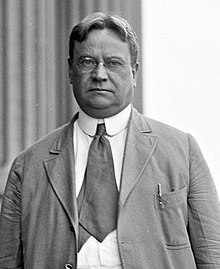Hiram Warren Johnson
| Hiram Johnson | |
|---|---|
 |
|
|
United States Senator from California |
|
|
In office March 16, 1917 – August 6, 1945 |
|
| Preceded by | John D. Works |
| Succeeded by | William F. Knowland |
| 23rd Governor of California | |
|
In office January 3, 1911 – March 15, 1917 |
|
| Lieutenant |
A. J. Wallace John Morton Eshleman William Stephens |
| Preceded by | James Gillett |
| Succeeded by | William Stephens |
| Personal details | |
| Born |
Hiram Warren Johnson September 2, 1866 Sacramento, California |
| Died | August 6, 1945 (aged 78) Bethesda, Maryland |
| Political party | Progressive, Republican |
| Spouse(s) | Minne L. McNeal |
| Alma mater | University of California, Berkeley |
| Profession | Politician |
Hiram Warren Johnson (September 2, 1866 – August 6, 1945) was a leading American progressive and isolationist politician from California; he served as the 23rd Governor of California from 1911 to 1917, and as a United States Senator from 1917 to 1945. He was Theodore Roosevelt's running mate in the 1912 presidential election on the Progressive (also known as the "Bull Moose") party.
Johnson was born in Sacramento, California on September 2, 1866; his father was Grove Lawrence Johnson, a Republican Representative and a member of the California State Legislature who was accused of election irregularities and using his political offices to look after his personal financial interests. His mother was Annie DeMontfredy, partially descended of a family of Huguenots who had left France after the Edict of Nantes, to escape religious persecution. Annie was a member of the Daughters of the American Revolution, claiming descent from a general of the Continental Army. Johnson had a brother and three sisters.
After attending public schools and Heald College, Johnson first worked as a shorthand reporter and stenographer in law offices. He eventually pursued a legal career, studying at the University of California, Berkeley, where he was a member of the Chi Phi Fraternity. He was admitted to the bar in 1888 and commenced practice in his hometown. In 1902, he moved to San Francisco. He served as assistant district attorney and became active in reform politics, taking up an anti-corruption mantle. He attracted statewide attention in 1908 when he assisted Francis J. Heney in the graft prosecution of Abe Ruef and Mayor Eugene Schmitz. His success was due in large measure to the fact that after Heney was gunned down in the courtroom, he took the lead for the prosecution and won the case. He married Minne L. McNeal; the couple had two sons.
...
Wikipedia
